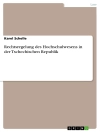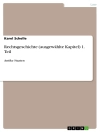Academic Paper from the year 2022 in the subject Law – Miscellaneous, Mzumbe University, language: English, abstract: Admissions and confessions are these statements are admissible on the strength that admissible as exceptions to the rule against hearsay evidence . They are based on the principle that no person can make statement against his own interest unless it is true.
The general rule in both civil and criminal cases is that any relevant statement made by a party is evidence against him. In civil cases, for instance, statements made out of court by a party to the proceedings or by a person connected with him by any of the relationships are admissible in evidence against but not usually in favor of such a party.
In regarding to the law of Evidence Act which covers different aspects including both substantive and procedural rules, has attributed it a substantive law at the same time it’s a procedural law. Therefore taking Confession, the Court of Appeal has often provided information on how our Judges (Justice of Peace) are required to take confession or confession of wrongdoing. Unfortunately, these instructions have been disregarded and thus have been the source of many dismissal appeals by this Court. Factors to consider are clearly stated in the case of Hatibu Gandhi & Others v.
Republic and Petro Teophan vs The Republic. It will be better if they were read intensively and educate judges in courts of law. Aggrieved with those Court of appeal decisions, the judges should go through the book called ‘A Guide for Justice of the Peace’.To expedite the implementation of these resolutions herein, we have explained the whole substantive and procedure for taking a confession statement.
Про автора
”Aequitas est quasi aequalitas’












